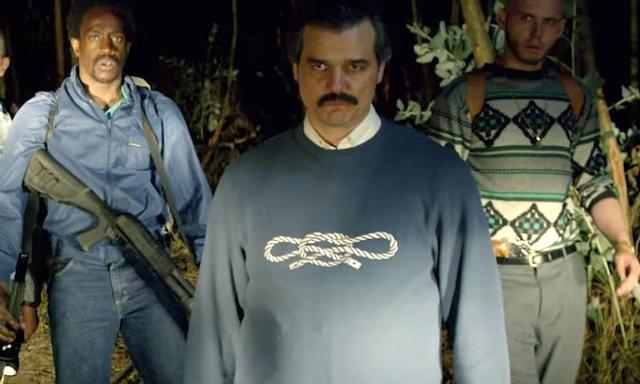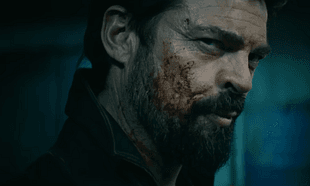(Spoilers Ahead)
The story of Pablo Escobar is one that's been covered in countless low-rent TV documentaries and one or two forgettable TV miniseries, but it's only since Netflix and Jose Padilha's attempt at turning the King of Cocaine's life and times that it's actually convincingly worked. A large part of that is down to the pitch-perfect casting of Wagner Moura, who plays the role of Pablo Escobar.
While the first season was more hit than miss, it was clear that Moura's portrayal of Escobar was a shining light. It's easy enough for anyone to play a caricature of a Colombian drug kingpin, but the real difficulty and talent comes from bringing out the nuances of the character and making the audience invest in the character when, by all accounts, you should be cheering for his death. Throughout the entire season, we know death is stalking Pablo Escobar and his days are numbered. The opening episode sees Escobar and his band of sicarios - henchmen, essentially - literally walking out of La Catedral, the jungle prison which he built as part of his deal with the Colombian government.
This is, naturally, seen as an embarrassment to the government - and the DEA, led by Boyd Holbrook and Game of Thrones' Pedro Pascal - and desperate measures have to be taken, namely the return of the near-insane Col. Carillo. More than anything, it's made clear that everyone - be it the Cali Cartel, the DEA, the Search Bloc sent to hunt him or even a paramilitary group of right-wing soldiers - is prepared to stop at nothing to bring him down, whatever it takes.

As mentioned, Wagner Moura really does deserve a huge amount of credit for making Narocs feel, sound and look believable. It's in the small, human moments that Moura's portrayal of Escobar really hits home and we see that, for all his violence and greed, there was a human underneath it. There's a great line in the final episode that Boyd Holbrook's character says about Escobar, saying that he's not the Devil, he's just a fat man with graying hair. There are no moments of Escobar laughing maniacally, but the series does take a few moments to allow Escobar to satisfyingly deal with his enemies; one scene in particular sees Escobar returning a bullet sent to him in a particularly brutal fashion. Of course, this is short-lived and by the end of season, we see him brought low, frightened and desperate. The arc is played out beautifully and you truly are conflicted about the thought of him dying.
Meanwhile, Boyd Holbrook and Pedro Pascal play the chainsmoking DEA agents Murphy and Pena with an assured ease. What's made clear is that whatever the DEA have been doing up until now, it hasn't worked and the rules are changing. Pascal's character, Javier Pena, goes through truly dark moments and has to grapple with the reality that defeating Escobar may cost him a piece of his soul, whilst Holbrook's character, Murphy, has to cut off his family life in order to survive. Smartly, neither are the focus of the show because there's only so much that can be explored here. Instead, the supporting storylines shift to Escobar's circle of sicarios and his enemies. Limon, played by Leynar Gomez, really adapts into the role with an incredible range. At the beginning of the series, he's recruited by Escobar's chief assassin, La Quica, and is like a deer in headlights and, by the end, he's just as ruthless as Escobar himself. La Quica, played by Diego Catano, has a chillingly vacant performance. You really get the sense that there is nothing behind his eyes.

There really is an impressive cast of colourful - if that's the right word - characters working in Narcos and the writing and acting allows each of them to be distinct from one another. Despite the amount of moving parts, Narcos never feels cluttered or extraneous. Any of the supporting storylines feed into the one driving factor behind the second season - Escobar's capture or death. This focus, which the first season really lacked, is hugely important to making it so effective. Many of the episodes lead nicely into the next, with no one episode feeling like it's a filler. The only one that could be accused of this is the penultimate episode, which sees Escobar briefly reuniting with his father whilst on the run. However, it's handled so well and written so well that it just adds more emotional impact to the finale.
Overall, Narcos is one of the finest examples of a crime series on television. Like Breaking Bad, it luxuriates on its central character and allows the character to fully develop over an entire season. Thrilling in every episode and surprisingly emotional, Narcos' second season is the watermark for the series. How they're going to top it is anyone's guess.




















































































